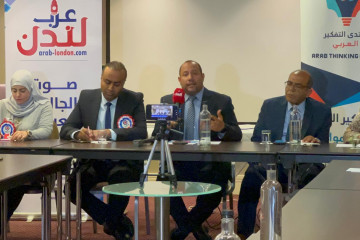

On Tuesday evening, five British Arab candidates set to stand in the UK general election attended a public meeting to present their manifestos and exchange frank discussions with an audience of potential voters.
The meeting — the first of its kind — was organised by the Arabs of London platform and the Arab Thinking Forum and featured a lively discussion on the candidates' electoral programmes as well as questions from attendees, many of whom were prominent figures within the UK's Arab community and included cultural figures, journalists and activists.
As the British electorate gears up to go to the polls on July 4, analysts predict some surprises may be in store.
While the Conservative Party looks set to lose its current majority, the Labour Party, which is the other main party in Britain, has alienated parts of the British public – particularly concerning its stance on Israel's war on Gaza.
The issue has seen intensive mobilisation of the Arab and Muslim communities in the UK, and many British Arab candidates have decided to stand.
Muhammad Amin, Chair of the Arab Thinking Forum and the Arabs of London platform opened the meeting by stressing the importance of this gathering in light of the ongoing tensions, especially with the Gaza war entering its ninth month and with just days to go before what he termed "pivotal" elections.
He pointed out that these elections presented an opportunity for Arabs in Britain to participate actively as candidates — not just voters.
He also strongly urged Arabs in Britain to make sure they voted, stressing that the British government's stance on the Gaza war called for a strong response from Arab voters.
Dr Khalid Abu Tayyem, a British Palestinian standing for election in Cambridge, said: "The decision [leading to] the Nakba happened here, and so it should also buried in this country — through politics and democracy. For me, entering the British political arena today is necessary because these elections are not just Britain's elections; they are Gaza's elections."
Mona Adam, a British Sudanese political activist and local councillor will be standing as a Green Party candidate. She said that the cutting off of water and electricity in Gaza was a turning point for her, as she is from a country that has suffered from war.
"I felt pain and responsibility, which is why I went from the Labour Party to the Green Party — which is calling for hope and real change," she said to attendees at the event.
She said the most important point for her in her electoral programme was advocating for world peace, because Palestine wasn't the only place at war.
She pointed out that many other countries were also suffering, like Iraq, Syria, Sudan and Yemen, however, "we only notice when we see what is happening in Gaza, which is a magnified picture of what has been happening and is happening in other Arab and Islamic countries," she said.
Nada Jarche, a British Palestinian candidate, said she had decided to stand due to the absence of Arab voices in Parliament and to be a role model for the next generation.
She said Gaza was her top priority as it was "her cause", adding that her family had been expelled from Palestine during the Nakba ("Catastrophe") in 1948.
She also wishes to be the voice of the voiceless in the area she represents – both on international issues and local matters like medical services, housing, taxes, and university education.
British Jordanian Helmi Alharahsheh is running as an independent candidate after resigning from the Labour Party in protest at its pro-Israel policies.
He said: "There are currently 463 independent candidates in Britain, and the main reason behind this huge number of independents is clear - dissatisfaction with all the political parties and people's thirst for change."
Meanwhile, British Palestinian activist Sameh Habeeb, who is standing with the Workers Party of Britain, commented that what was unique about these elections didn't just concern the war on Gaza — although that was "fundamental."
However, he urged listeners to also look at the broader picture: "We are witnessing the rise of the [far-]right in general across Europe — after it was marginalised for a long time."
Attendees at the packed meeting included Palestinian journalist Majed Abdel Hadi, Palestinian academic Dr Nihad Khanfar and Sabah al-Mukhtar, the president of the Arab Lawyers Association, who praised the Arabs of London platform and the candidates who had put themselves forward to stand on July 4.
There were also remarks from Dr Anas Altikriti, president of The Cordoba Foundation for Intercultural Dialogue, and Alaraby TV journalist Abdellahi Sidiya , as well as several other well-known figures from the Arab community.
The Arabs of London platform, established in 2018, is the largest forum dedicated to the Arab community in Britain, and is actively encouraging British Arabs to vote in the fast-approaching elections which haven been arranged as Israel's war continues – an issue that has become a top concern for many among the British electorate.
This is an edited translation from our Arabic edition. To read the original article click here.
Translated by Rose Chacko
This article is taken from our Arabic sister publication, Al-Araby Al Jadeed and mirrors the source's original editorial guidelines and reporting policies. Any requests for correction or comment will be forwarded to the original authors and editors.
Have questions or comments? Email us at: info@alaraby.co.uk




 Follow the Middle East's top stories in English at The New Arab on Google News
Follow the Middle East's top stories in English at The New Arab on Google News


